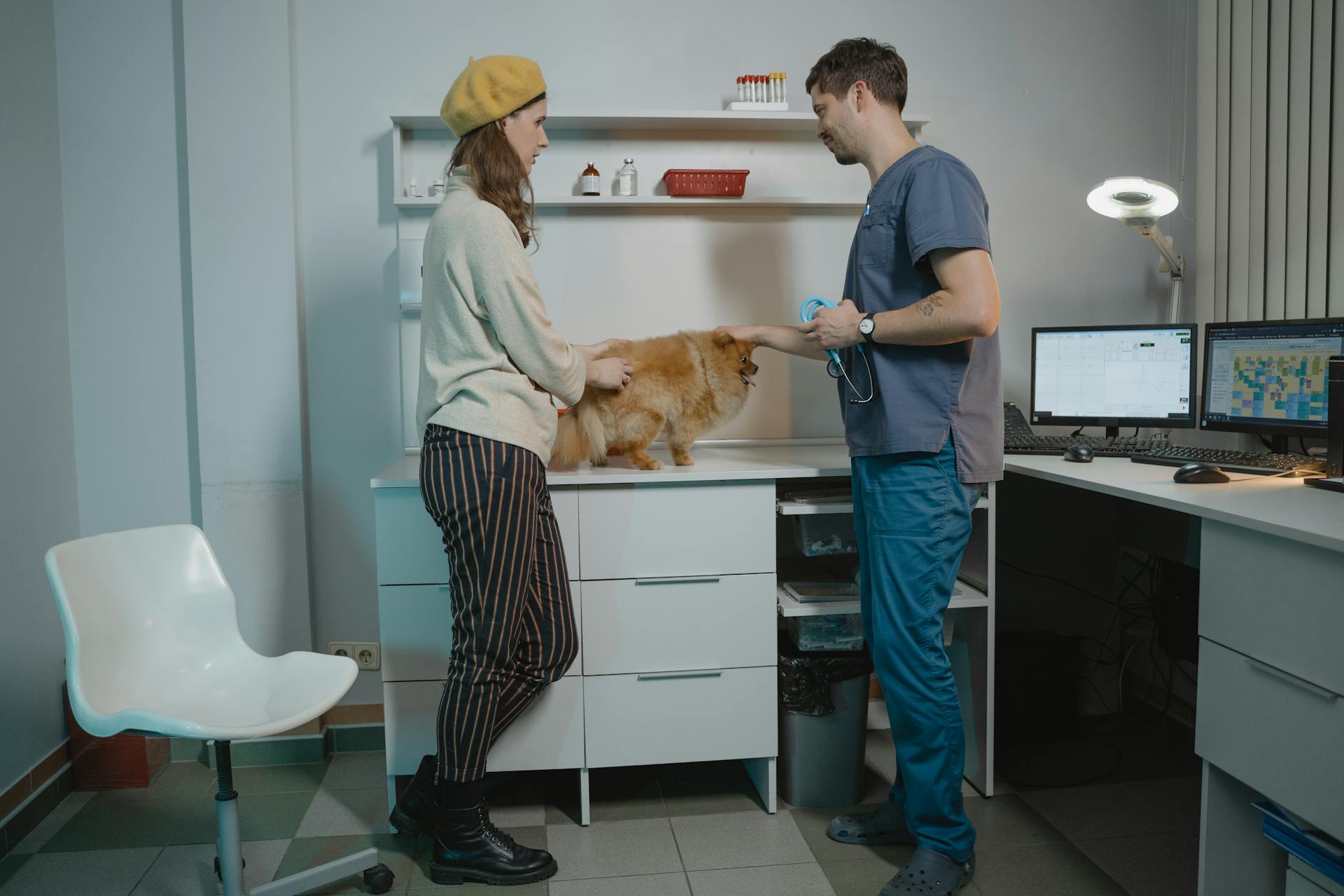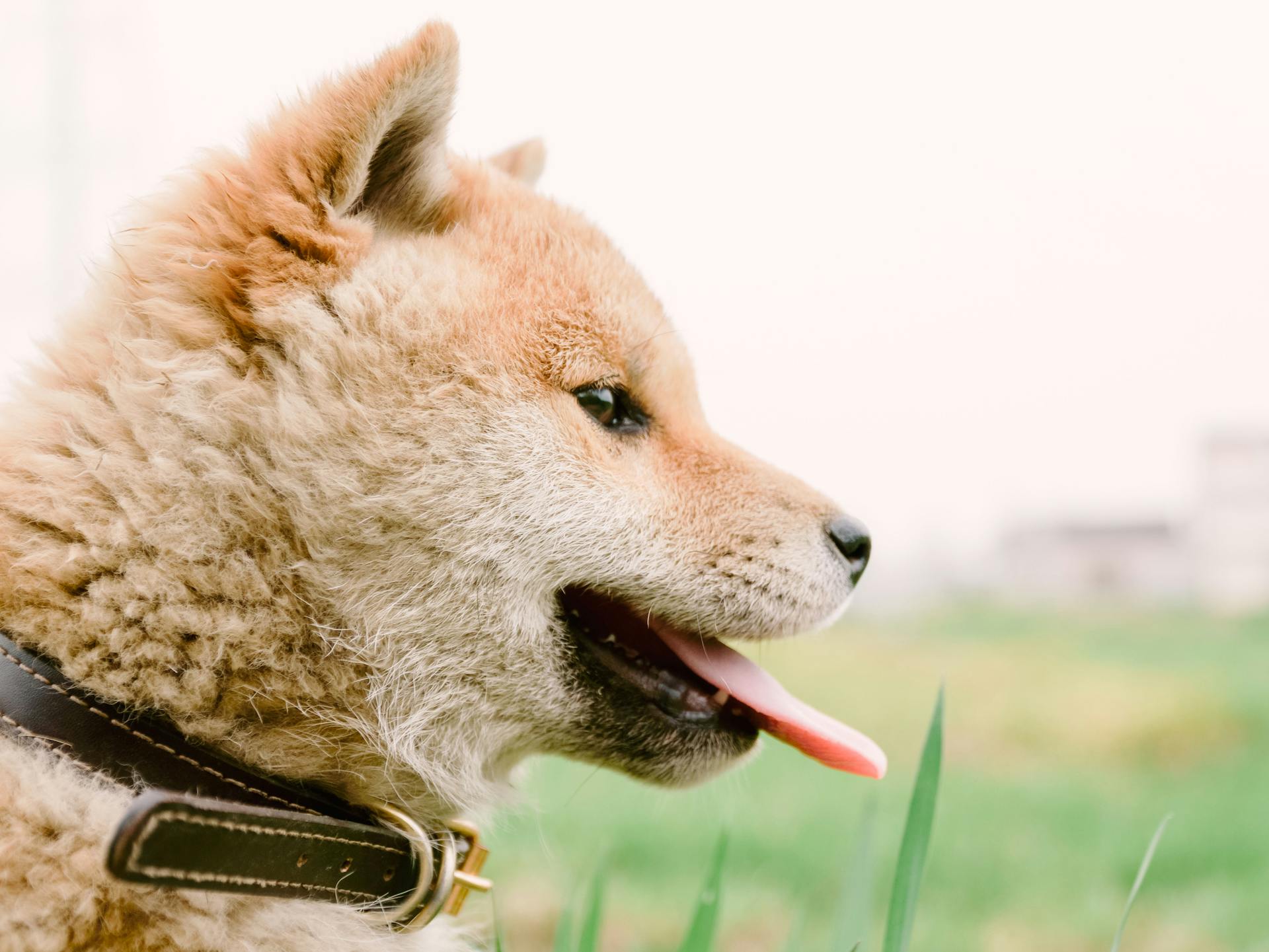
Losing a dog is never easy, and it's essential to be supportive and understanding when someone is grieving. Acknowledge their pain with a simple "I'm so sorry for your loss", which shows you care about their feelings.
The grieving process can be intense, and it's common for people to feel overwhelmed with emotions. Their dog was a member of the family, and the bond they shared was strong.
You can also offer a comforting phrase like "Their memory will live on in your heart", which can provide some solace during this difficult time.
See what others are reading: When Someone Says It's Just a Dog?
Providing Sympathy and Support for Grief
It's common for people to be overwhelmed by messages of condolence in the immediate aftermath of a loss, only to be left without support a few days or weeks later. Try to provide some support throughout the grieving process.
Check in with them more than once, as people often need ongoing support during this time. You can say something like, "Thinking about you and your pet" to express your sympathies in a simple and effective way.
For your interest: Lap of Love Pet Loss Support
Losing a beloved pet can feel much like losing part of the family. Acknowledge the significance of this loss through carefully chosen words, such as "It's difficult to lose someone in the family."
Actions speak loudly, and showing up for someone who has lost a pet can be incredibly supportive. You can offer physical comfort, like a hug or squeeze of their hand, or give them space to talk about it.
To provide comfort after someone loses a pet, you can:
- Provide physical comfort, like a hug or squeeze of their hand
- Give them space to talk about it
- Provide accepting, non-judgmental, validating support
- Cry alongside them
It's also essential to reduce the burden of daily stressors by doing things like cooking meals, cleaning, or running errands for them. You can say, "Is there anything I can do to help?" or "I have dinner on the stove, can I bring you some?"
Understanding Grief
Grief is a natural reaction to losing a loved one, and it's no different when it comes to losing a pet. Losing a pet can feel much like losing part of the family. If applicable, think about how you might feel about your own pet and what you would go through if something happened.
Grieving isn't reserved for the loss of humans, and feeling emotionally vulnerable is natural when you lose a pet. Your friend needs to process their feelings.
There are different types of grievers, and it's essential to understand what type of griever your friend is. They may be an inward griever, needing time and space to recognize and deal with their feelings, or they may be an instrumental griever, who may not want physical or verbal condolences.
Here are some types of grief:
- Delayed grief: occurs when the grieving process is delayed due to various factors.
- Complicated grief: occurs when the grieving process is prolonged or intense.
- Chronic grief: occurs when the grieving process lasts for an extended period.
- Masked grief: occurs when the grieving person hides their emotions.
- Distorted grief: occurs when the grieving person has a distorted view of the loss.
- Inhibited grief: occurs when the grieving person is unable to express their emotions.
Understanding these types of grief can help you better empathize with your friend's sentiments and provide the best care possible, depending on their wishes.
Offer Comfort and Support
It's essential to be empathetic and put yourself in their shoes. As Example 12 explains, "If your friend displays instrumental grief, it means they are an inward griever. They need time and space to recognize and deal with their feelings." You can show your support by sharing resources or information about a local pet loss support group.
When it comes to physical touch, it's essential to respect their boundaries. If they enjoy physical touch, a hug or a squeeze of their hand can be comforting. However, if they don't, it's best to avoid it. As Example 7 states, "Provide physical comfort, like a hug or squeeze of their hand. If they enjoy physical touch, you could also consider getting them a gift card for a massage or manicure."
You can also offer to help with daily tasks, such as cooking meals or running errands. This can help reduce their burden and make them feel more comfortable. As Example 9 suggests, "Reduce the burden of daily stressors by doing things like cooking meals, cleaning, or running errands for them."
Here are some thoughtful gestures you can make to show your support:
- Send a pet sympathy card with a personalized message.
- Bring over a meal or order their favorite takeout.
- Send flowers or a plant to brighten up their space.
- Make a donation to an animal charity in their dog's name.
- Offer to host a memorial service or help them create a special place to honor their dog.
Remember, everyone grieves differently, so it's essential to be patient and understanding. As Example 14 advises, "There are so many wonderful memories you've had with [pet name]. They were so loved and will be missed dearly."
Here for You
If your friend is an inward griever, they may need time and space to deal with their feelings. They might not want physical or verbal condolences, but you can still show you care through less intrusive ways, such as sharing resources or information about a local pet loss support group.
You can also send them poems or genuine quotes about losing a loved one. Giving them ideas on how to memorialize their companion or celebrate the life of their pet may soothe their emotions.
If your friend is an outward griever, they will likely appreciate your presence and attention. Ask them to share stories about their dog, and verbalize your fondest memories to show you loved their furry friend as well.
Being there for your friend in a time of tragedy means listening more than you talk. Be accepting and patient, and if it feels natural, cry with them and show signs of affection. Physical comfort, like holding their hand or touching their shoulder, gives a feeling of comfort without having to say anything.
You can also bring them something to help them memorialize their pet, such as a plant, personalized gift or flowers. Even bringing your friend their favorite food, cooking dinner or helping them set up a new routine can be meaningful.
What to Avoid
When you're trying to comfort a friend who's lost their dog, it's easy to say the wrong thing. Here are some phrases to avoid:
Saying "At least you gave Spot a good life" might seem like a kind thing to say, but it can actually make your friend feel invalidated.
This phrase implies that the quality of the dog's life is what matters most, rather than the loss itself.
Some people might say "She's in a better place", but this can be painful for a friend who wants their dog back home with them.
This phrase can be especially hurtful if your friend is not religious or doesn't believe in an afterlife.
Saying "He was just a dog" can minimize the significance of the loss for your friend.
For many people, grieving a pet is a life-changing experience that's just as devastating as losing a family member.
Suggesting "Why don't you try moving on with a new pet?" might seem like a helpful idea, but it's unlikely to be well-received.
Your friend's heart is still full of love for their old dog, and getting a new pet to fill the hole is probably unthinkable to them.
Frequently Asked Questions
How to acknowledge the loss of a pet?
Acknowledge the loss of a pet with empathy and understanding, expressing condolences and sharing fond memories to help the grieving process. A simple message or post can go a long way in showing support and validation for the pet owner's emotions.
What not to say to someone who lost a pet?
When someone loses a pet, avoid insensitive comments that minimize their loss, such as comparing it to getting another pet or saying you're not a fan of their pet's species. Instead, offer empathy and understanding to help them process their grief.
Sources
- https://www.betterhelp.com/advice/grief/dealing-with-heartache-what-to-say-when-a-pet-dies/
- https://www.funeralwise.com/pet-loss/how-to-cope/what-to-say/
- https://agapepetservices.com/pet-loss-supporting-a-friend/
- https://www.wikihow.com/What-to-Say-when-Someone%27s-Dog-Dies
- https://centerforpetlossgrief.com/what-to-say-to-someone-experiencing-pet-loss/
Featured Images: pexels.com


